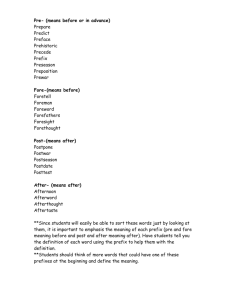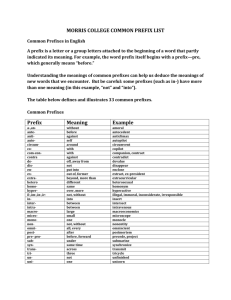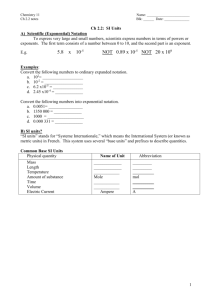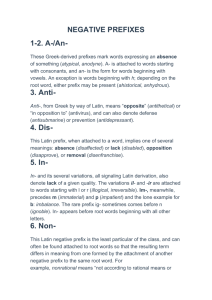Mediterranean Journal of Social Sciences
advertisement
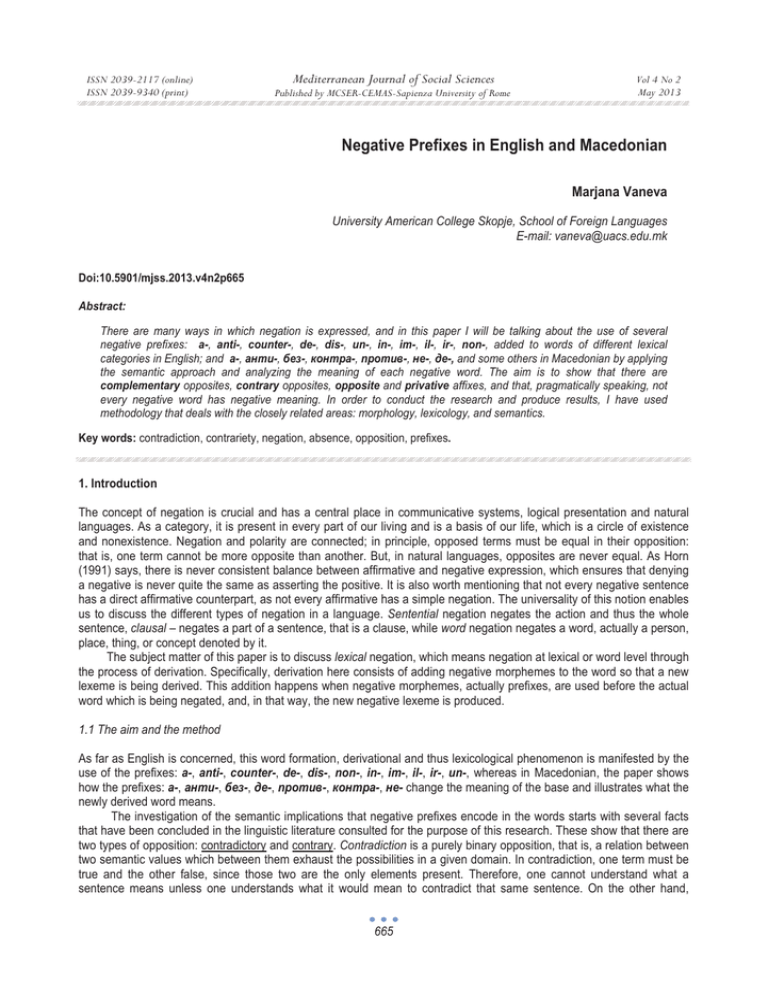
ISSN 2039-2117 (online) ISSN 2039-9340 (print) Mediterranean Journal of Social Sciences Published by MCSER-CEMAS-Sapienza University of Rome Vol 4 No 2 May 2013 Negative Prefixes in English and Macedonian Marjana Vaneva University American College Skopje, School of Foreign Languages E-mail: vaneva@uacs.edu.mk Doi:10.5901/mjss.2013.v4n2p665 Abstract: There are many ways in which negation is expressed, and in this paper I will be talking about the use of several negative prefixes: a-, anti-, counter-, de-, dis-, un-, in-, im-, il-, ir-, non-, added to words of different lexical categories in English; and ɚ-, ɚɧɬɢ-, ɛɟɡ-, ɤɨɧɬɪɚ-, ɩɪɨɬɢɜ-, ɧɟ-, ɞɟ-, and some others in Macedonian by applying the semantic approach and analyzing the meaning of each negative word. The aim is to show that there are complementary opposites, contrary opposites, opposite and privative affixes, and that, pragmatically speaking, not every negative word has negative meaning. In order to conduct the research and produce results, I have used methodology that deals with the closely related areas: morphology, lexicology, and semantics. Key words: contradiction, contrariety, negation, absence, opposition, prefixes. 1. Introduction The concept of negation is crucial and has a central place in communicative systems, logical presentation and natural languages. As a category, it is present in every part of our living and is a basis of our life, which is a circle of existence and nonexistence. Negation and polarity are connected; in principle, opposed terms must be equal in their opposition: that is, one term cannot be more opposite than another. But, in natural languages, opposites are never equal. As Horn (1991) says, there is never consistent balance between affirmative and negative expression, which ensures that denying a negative is never quite the same as asserting the positive. It is also worth mentioning that not every negative sentence has a direct affirmative counterpart, as not every affirmative has a simple negation. The universality of this notion enables us to discuss the different types of negation in a language. Sentential negation negates the action and thus the whole sentence, clausal – negates a part of a sentence, that is a clause, while word negation negates a word, actually a person, place, thing, or concept denoted by it. The subject matter of this paper is to discuss lexical negation, which means negation at lexical or word level through the process of derivation. Specifically, derivation here consists of adding negative morphemes to the word so that a new lexeme is being derived. This addition happens when negative morphemes, actually prefixes, are used before the actual word which is being negated, and, in that way, the new negative lexeme is produced. 1.1 The aim and the method As far as English is concerned, this word formation, derivational and thus lexicological phenomenon is manifested by the use of the prefixes: a-, anti-, counter-, de-, dis-, non-, in-, im-, il-, ir-, un-, whereas in Macedonian, the paper shows how the prefixes: ɚ-, ɚɧɬɢ-, ɛɟɡ-, ɞɟ-, ɩɪɨɬɢɜ-, ɤɨɧɬɪɚ-, ɧɟ- change the meaning of the base and illustrates what the newly derived word means. The investigation of the semantic implications that negative prefixes encode in the words starts with several facts that have been concluded in the linguistic literature consulted for the purpose of this research. These show that there are two types of opposition: contradictory and contrary. Contradiction is a purely binary opposition, that is, a relation between two semantic values which between them exhaust the possibilities in a given domain. In contradiction, one term must be true and the other false, since those two are the only elements present. Therefore, one cannot understand what a sentence means unless one understands what it would mean to contradict that same sentence. On the other hand, 665 ISSN 2039-2117 (online) ISSN 2039-9340 (print) Mediterranean Journal of Social Sciences Published by MCSER-CEMAS-Sapienza University of Rome Vol 4 No 2 May 2013 contrary opposition is a relation among many terms on the scale, and it is not the case that if one entity is negated, it is a negative counterpart of the term on the other end, because there are not only two terms, but several which exhibit the scalar character of this kind of opposition. Consequently, in contrariety only one term can be true, although both can be false (Israel, 2004, p. 701-702). The distinction can be illustrated by the following example: Mary is a smoker. ~ Mary is a non-smoker. It is contradiction that is in question here, simply because we are dealing with two features on the scale: smoker and nonsmoker, and only one of them is true: Mary either smokes or doesn’t smoke, there is no other option. The second kind of opposition can be exemplified by the following pair of sentences: Mary is happy. ~ Mary is unhappy. This is an explicit kind of contrariety, simply because of the fact that if Mary is not happy, it doesn’t necessarily mean that she is unhappy. Instead, she can have a characteristic which is somewhere else on the scale but not to be characterized by any of these two extremes. In other words, she can be neither happy, nor unhappy but somewhere in between, that is, negation of happy does not bring us to the term unhappy, because her state can be other than the one described by these two adjectives. Furthermore, if we take the cases with attractive and not unattractive, we can see that they do not express the same meaning. Attractive inclines towards the positive end of the scale that has ugliness at the negative end but beauty at the positive end, with a range of indeterminate looks in the middle. The un- moves the adjective towards the lower end of the scale. We can consider the following sentences: That book is available. That book is not available. That book is unavailable. The last two examples are equivalent of each other and they are both negation of the first sentence. Simply, to be not available is the same with unavailable. But the following sentences refer to different situations: Such behaviour is common. Such behaviour is not common. Such behaviour is uncommon. Namely, the second sentence contradicts the positive, but the third doesn’t, because the behaviour can be either common or not common. While the third – uncommon is contrary to the first, it is somewhere on the scale, but not at the opposing poles. Therefore, it is possible to say: Such behaviour is not common, but it is not uncommon either. The reasoning behind this is that not common covers a far larger area of the scale than uncommon, and therefore, not common and uncommon are not the same. This difference is better shown with the intensifier very: Such behaviour is not very common. Such behaviour is very uncommon. Very shows a narrower area of the scale than common does, and similarly very uncommon shows a narrower area than uncommon, while the in-between area is greater and thus the difference in meaning is more obvious (Huddleston & Pullum, 2002, p. 821-822). 666 ISSN 2039-2117 (online) ISSN 2039-9340 (print) Mediterranean Journal of Social Sciences Published by MCSER-CEMAS-Sapienza University of Rome Vol 4 No 2 May 2013 According to the research done until now, it has to be made clear that the negative prefix un-, the most common and most productive of all negative prefixes attached to English words, has three meanings and interpretations. The first meaning of un- is strictly negative indicating ‘absence or lack of something’, which means that by putting this prefix before the base, we come to an entity that lacks the property contained in the base. Such a negative is unable as opposed to able, when the negated word means ‘absence or lack of ability’. The second meaning of this prefix is privative, which implies that by adding the prefix we remove the entity denoted by the base word. For example, unmask means ‘to remove the mask’. The third meaning that is established is reversal, that is, the negative word denotes an activity, since it is most productive with verbs, which will bring the entity to the state it had been before the action was performed. Reversal undoubtedly involves opposition, because unbutton means to perform an opposite action of the one that has already been performed. Thus, something must have been buttoned before in order to be unbuttoned later. In this paper, attention will also be paid to words that are negative in form, and convey semantically negative, but pragmatically positive meaning. All these characteristics of negative prefixes shall be explored in Macedonian words too, and they will be used for analysis to the extent to which the morpho-semantic system of the language allows this kind of research. The morphological part lies in the analysis of the structure of the newly produced word, actually stating what the base is to which a certain negative prefix is attached. The semantic aspect of the method explains the meaning of the negatively prefixed word, that is, what type of meaning is implied with the negative prefix. 2. Negative prefixes in English As said in the introduction, I will discuss the different types of opposition distinguished by the use of negative prefixes. Therefore, the most common prefixes will be chosen and the most representative examples will be given and analysed. 2.1 Contradictory opposition In English, the most common and frequently used negative prefix is un-, attached mostly to native English, but also to certain Latinate words. As for the categories, it is equally used with nouns, verbs, adjectives, and adverbs. It is undoubtedly used for opposition, and, as it is explained above, this type of opposition contradicts one of the two existing terms. Thus, one is always true, and consequently, the other always false. In most cases, this result is achieved with the prefix un-. Some typical examples are: unreasonable ~ opposite of reasonable unfair ~ opposite of fair unable ~ opposite of able unsympathetic ~ opposite of sympathetic unproductive ~ opposite of productive unbelievable ~ opposite of believable unclear ~ opposite of clear unhelpful ~ opposite of helpful unintelligible ~ opposite of intelligible unjust ~ opposite of just unwise ~ opposite of wise The productivity of un- is obvious in the formation of adjectives with present and past participles as well: unfeeling ~ opposite of feeling unthreatening ~ opposite of threatening undecided ~ opposite of decided unjustified ~ opposite of justified When it comes to nouns, the use and result are the same: 667 ISSN 2039-2117 (online) ISSN 2039-9340 (print) Mediterranean Journal of Social Sciences Published by MCSER-CEMAS-Sapienza University of Rome Vol 4 No 2 May 2013 untruth ~ opposite of truth unemployment ~ opposite of employment unrest ~ opposite of rest or peace unease ~ opposite of ease unprofitability ~ opposite of profitability Adverbs also take this prefix: unwisely ~ opposite of wisely unfortunately ~ opposite of fortunately unoriginally ~ opposite of originally unlikely ~ opposite of likely unavoidably ~ opposite of avoidably Taking into consideration the fact that when this prefix is used with verbs, we do not deal with contradiction any more, but privative or reversal meanings of the prefix come into question instead, this situation will be analysed in section 2.3. Yet, in all these examples, the base is contradicted by using the word with the negative prefix – the left one. A variation of the negative prefix un- is in- which is of Latin origin and along with the other variations im-, il-, ir-, it is used to express contradiction, as the following examples show: incomplete ~ opposite of complete inconsistent ~ opposite of consistent incorrect ~ opposite of correct invulnerable ~ opposite of vulnerable insane ~ opposite of sane inanimate ~ opposite of animate inflexible ~ opposite of flexible inhuman ~ opposite of human insecure ~ opposite of secure intolerable ~ opposite of tolerable impolite ~ opposite of polite impossible ~ opposite of possible immature ~ opposite of mature improper ~ opposite of proper immodest ~ opposite of modest illogical ~ opposite of logical illegal ~ opposite of legal illiterate ~ opposite of literate irregular ~ opposite of regular irresponsible ~ opposite of responsible irrelevant ~ opposite of relevant irresistible ~ opposite of resistible irreparable ~ opposite of reparable. All these show that it is either one or the other term; they all represent the contradictory opposition, since the term on the left contradicts the one on the right. 668 ISSN 2039-2117 (online) ISSN 2039-9340 (print) Mediterranean Journal of Social Sciences Published by MCSER-CEMAS-Sapienza University of Rome Vol 4 No 2 May 2013 But, some words are not about negation, that is, in the case with improve we are not dealing with negation of prove. We mention it here to draw attention to words which seem to be negative, when, as a matter of fact, the word does not consist of a prefix and base, and has nothing to do with negation, but it is a simple lexeme instead. For those cases when the negative prefix is really attached to the base of the word, and the lexeme appears to be negative in form, but pragmatically speaking has a positive meaning, we will dedicate a separate part of the paper. There we shall analyse what people usually expect the word to mean when they encounter it, and what it really means, despite the form. Another negative prefix used in contradiction is dis-; it is a negative prefix of Latin origin that means ‘not’: disorder ~ opposite of order dishonest ~ opposite of honest discontent ~ opposite of content disobey ~ opposite of obey disagree ~ opposite of agree dissatisfied ~ opposite of satisfied disloyal ~ opposite of loyal dissimilar ~ opposite of similar. A- is another Greek prefix used for contradicting things, and it means ‘not’ or ‘without’. It is mostly found in scientific terminology, especially with words in medical science. The examples are: amoral ~ without moral achromatic ~ without form (chromatic: with form) asymmetry ~ without symmetry. These words should be learned as having a base to which the prefix a- or its variation ab- has been prefixed, thus producing a word with negative semantics. It should be taken into account that the prefix and the base have separate meanings, independent of each other. This prefix is easily confusable with the native English prefix a-, as in ago, asleep, aside, but the latter does not have anything to do with negation. The prefix a- is more than often only used with Greek and Latinate stems, and the stems are often adjectives that describe the properties of certain objects (nouns). This restriction makes the prefix less productive in Modern English, as apart from technical terms, new words are seldom coined from Greek. The prefix non- is less frequent than un- and it picks out the set of things that are not in the category denoted by the stem to which it is attached. It occurs more freely with nouns than many of the other prefixes do. Here are some examples: non-essential ~ not essential non-existent ~ not existent non-standard ~ not standard non-violent ~ not violent non-native ~ not native nongovernmental ~ not governmental nonstandard ~ not standard nonsense ~ without sense nonalcoholic ~ without alcohol. These lexemes show contradictory opposition because there are only two terms, and by negating the positive element, we come to its negative counterpart, which is the only left of the two opposing poles. Therefore, the speaker is either native or not, there is no other choice and term in between. 2.2 Contrary opposition The examples and the analysis will illustrate the scalarity of this type of opposition and its manifestation in the language. 669 ISSN 2039-2117 (online) ISSN 2039-9340 (print) Mediterranean Journal of Social Sciences Published by MCSER-CEMAS-Sapienza University of Rome Vol 4 No 2 May 2013 Firstly, we can look at the interpretation and the explanation which stem from the use of the example: dislike ~ it is not the case that something has been liked and now the action is reversed, nor is it the case that we express contradictory opposition, because it is not that we either like or dislike something, or that if we don’t like something, we hate it. It simply negates the element on the other end of the scale, but there are other terms in between. Thus, we can like, dislike something, or have neutral feelings and be reserved about it. With unhappy, it is not that the person can be either happy or unhappy; he/she can display other feelings and be in a state between these two ends. Unhappy equals miserable or sad, and a person can be more or less happy. Contrary opposition is expressed with another Greek prefix anti-, which does not merely mean ‘not’, but ‘against’, as shown in continuation. The explanation is that a person can be for something, against something, but can also have neutral feelings and attitudes and not take one stand specifically. Hence, we can analyse the following examples: anti-slavery ~ against slavery anti-abortion ~ against abortion anti-art ~ against art antiwar ~ against war antisocial ~ against socializing with people anticancer ~ against cancer (intended for treating cancer) antipoison ~ against poison antiperspirant ~ against perspiration. There is a crucial distinction among the formations with non-, anti-, and un-. If somebody is nonreligious, then that person is not for religion or against religion, but simply has nothing to do with religion, that is, he or she is neutral. That person is somewhere else on the scale, and because of the scalarity here we talk about contradictory opposition, when the positive term is simply negated. With anti- the opposition is contrary; anti-smoking campaign is openly against smoking, and very similar to this, since untrue is quite opposite of true and equals false, it is on the other end of the pole. We can have a look at the following examples: anti-Christian ~ someone who is against Christianity anti-American ~ someone of any nationality who is against America un-American ~ someone who behaves in a way that is not American unchristian ~ someone who does not behave in a Christian manner non-Christian ~ someone who is not Christian non-American ~ someone who belongs to a nationality which is not American. As un- is a very productive negating prefix in English, it can actually attach to stems with a wider range of meanings, and it is the most preferred one when new words are coined. Many words can form negations with both non- and un-, which gives near synonymous pairs like nonreligious / unreligious, nonproductive / unproductive, and so on. But quoting American Heritage Dictionary, they differ in that: ‘un- picks out properties unlike those of the typical examples of the category. Thus, nonmilitary personnel are those who are simply not members of the military, whereas someone who is unmilitary is unlike a typical soldier in dress, habits, or attitudes’. 2.3 Privative or reversal meaning Negative prefixes show privative meaning when by adding the negative element to the base we deprive the base of the thing expressed with the basic element. In other words, with the negatively prefixed word we take the thing denoted with the assertive item. The reversal meaning is usually conveyed with verbs when the word with the prefix means to perform an action by which the action with the base word will be reversed, actually the newly derived – prefixed word denotes an action after which the result will be condition or state before the action of the base word has been performed. 670 ISSN 2039-2117 (online) ISSN 2039-9340 (print) Mediterranean Journal of Social Sciences Published by MCSER-CEMAS-Sapienza University of Rome Vol 4 No 2 May 2013 For example: untie ~ opposite of tie undo ~ opposite of do unpack ~ opposite of pack unwrap ~ opposite of wrap unmask ~ opposite of mask unzip ~ opposite of zip disconnect ~ opposite of connect distrust ~ opposite of trust discredit ~ opposite of credit discolour ~ opposite of colour defrost ~ opposite of frost deregulation ~ opposite of regulation deform ~ opposite of form denationalise ~ opposite of nationalise decentralise ~ opposite of centralise deregulate ~ opposite of regulate. In all these cases, regardless of the negative prefix, the meaning of the prefixed word is to perform a reversed action, which means that the action denoted by the assertive form has already been performed, and with the newly derived lexeme we do the opposite action, now cancelling the result of the previously done activity. In other words, we untie something that has already been tied, something has been done, and we reverse it – undo it, etc. There is difference in the semantics between the un- and dis- or mis- formations. For instance: able ~ unable (not able) ~ disabled (not being physically able, that is, being an invalid) armed ~ unarmed – (not carrying a weapon) ~ disarmed (having had one's weapon(s) taken away ) infected ~ uninfected (not having an infection) ~ disinfected (having removed possible sources of infection) used ~ disused (not used) ~ misused (wrongly used, used in a bad way) qualified ~ unqualified (not having the proper qualities or qualifications) ~ disqualified (having been removed from consideration). Counter- is a negative prefix that means the performance of an action as a reaction to another, to fight the effects of the other action. It means ‘made in reaction/opposition to’ (Huddleston & Pullum, 2002, p. 1688-1690). For example: counter-attack ~ to fight back, oppose the attack counterproductive ~ oppose the productivity of something and decrease its effects. Counter – refers to an action or event in response to another action or event, while anti- is used in order to prevent some action. Thus, antibacterial drug is a drug used for prevention, against bacteria, before the bacteria actually come, like in the following examples: antipoison ~ against poison antiperspirant ~ against perspiration while counterbacterial drug is a drug used as a remedy, to oppose or fight bacteria that have already infected the body. On the other hand, there are examples where the negative prefix shows a different kind of negation. For example, in antinovel, anti- still negates but the focus of the negation is shifted to the properties of a (n ordinary) novel, so it is not a 671 ISSN 2039-2117 (online) ISSN 2039-9340 (print) Mediterranean Journal of Social Sciences Published by MCSER-CEMAS-Sapienza University of Rome Vol 4 No 2 May 2013 novel when the term ‘novel’ is restricted to what is traditionally viewed as novel-like. Thus, antinovel is a novel that lacks its typical features. Similarly, anti-hero is a hero that does not have the genuine characteristics of such a character. In most cases, the negative prefixes are not interchangeable, so we do not have *unlegal or *apossible, for instance. Of course, fluent speakers have no problem in using the right prefix for the right word, since the negative adjectives are learned word by word, and so the mistakes are avoided. The native prefix un- can be used with participles and even participle phrases that are not common. It is thought that since the period around the Renaissance, many words of Latin, French or Greek origins have formed their negative forms with un-, giving adjectives like unconscious, unconditional, unfortunate, unsympathetic, and so forth. This also explains those pairs which use different prefixes in the nominal and the adjectival counterparts, like inability / unable, inequality / unequal, injustice / unjust, and instability / unstable. The prefixes dis-, in-, and non- are Latinate in origin. Similarly, words that go along with dis- and in- are mostly from Latin/French. They include words like dishonest, discourteous, dissimilar, inaccessible, inaccurate, insignificant, etc. On the other hand, while non- is also commonly associated with Latinate/French words such as nonnegotiable, non-judgmental and non-specific, it has become more productive than the other Latinate prefixes. This prefix can form negative adjectives with many present participles and past participles regardless of the origin of the stem word, such as non-smoking, non-caffeinated, and even with participle phrases, such as non-profit making, non-man made. Another interesting thing about non- is that it can often form negative adjectives by joining verbs, to express the meaning that the thing described does not perform the action described by the verb. Examples include non-stop, nonshrink, non-slip. Moreover, I will here try to elaborate on the fact that there are formations which are only pragmatically positive, while formally and semantically they are examples of negation. Such are: inflammable which means flammable and the others: ingenious ~ like a genius innumerable ~ a lot, that cannot be counted immeasurable ~ that cannot be measured because of being too much incredible ~ that cannot be believed because of being too good. They all receive the (positive) interpretation on the right as a result of their use in context; otherwise, they display negative polarity. 3. Negative prefixes in Macedonian In Macedonian, the same kinds of opposition, as in English, can be distinguished: contradictory and contrary, with the privative or reversal meaning recognized in some of the negative prefixes. 3.1 Contradictory opposition In this Slavic language, the contradictory opposition is mostly expressed with the prefix ɧɟ-. The explanation is the same as that given for English: this opposition includes only two terms which are at the end poles, and by negating one, we oppose it, and approach the other term, simply because there are no other elements in between. Here are some examples of this kind: ɨɠɝɠɳɭ (unskilled) ~ opposite of ɜɟɲɬ (skillful) ɨɠɥɛɟɛɫɠɨ (incapable) ~ opposite of ɤɚɞɚɪɟɧ (capable) ɨɠɩɜɦɠɲɠɨ (undressed) ~ opposite of ɨɛɥɟɱɟɧ (dressed) ɨɠɪɦɩɟɠɨ (infertile) ~ opposite of ɩɥɨɞɟɧ (fertile) ɨɠɝɣɬɭɣɨɣɭ (untrue) ~ opposite of ɜɢɫɬɢɧɢɬ (true) ɨɠɝɠɫɠɨ (unfaithful) ~ opposite of ɜɟɪɟɧ (faithful) ɨɠɜɫɣɲɠɨ (unshaved) ~ opposite of ɛɪɢɱɟɧ (shaved) ɨɠɡɠɨɠɭ (unmarried) ~ opposite of ɠɟɧɟɬ (married). 672 ISSN 2039-2117 (online) ISSN 2039-9340 (print) Mediterranean Journal of Social Sciences Published by MCSER-CEMAS-Sapienza University of Rome Vol 4 No 2 May 2013 The person is either ɜɟɲɬ (skillful) or ɨɠɝɠɳɭ (unskilled), no other possibility is left. Therefore, these examples are listed as contrary opposites. The prefix ɚ- and its variation ɚɛ- is also used for contradiction, as in English: ɛɧɩɫɛɦɠɨ (amoral) ~ opposite of ɦɨɪɚɥɟɧ, not ɦɨɪɚɥɟɧ ɛɬɣɧɠɭɫɣɲɠɨ (asymmetrical) ~ opposite of ɫɢɦɟɬɪɢɱɟɧ, not ɫɢɦɟɬɪɢɱɟɧ ɛɧɩɫɯɠɨ (amorphous) ~ without a form ɛɜɨɩɫɧɛɦɠɨ (abnormal) ~ opposite of ɧɨɪɦɚɥɟɧ, not ɧɨɪɦɚɥɟɧ. Ȼɟɡ- is another prefix used for negation: ɜɠɢɨɛɟɠɡɠɨ (hopeless) ~ opposite of ɧɚɞɟɠɟɧ (hopeful) ɜɠɬɬɣɦɠɨ (powerless) ~ opposite of ɫɢɥɟɧ (powerful) ɜɠɢɩɪɛɬɠɨ (harmless) ~ opposite of ɨɩɚɫɟɧ (harmful) ɜɠɢɩɦɩɝɠɨ (lead free) ~ opposite of ɨɥɨɜɟɧ (leaden). All the adjectives from the following group mean without + the base, but they cannot be expressed in that way to fit the interpretation, because the adjective with this form, without the negative prefix ɛɟɡ-, does not exist: ɜɠɢɟɩɧɠɨ (homeless) ~ without a home ɜɠɢɟɠɭɠɨ (childless) ~ without a child ɜɠɢɡɣɝɩɭɠɨ (lifeless) ~ without showing signs of being alive. 3.2 Contrary opposition In Ɍɨɥɤɨɜɟɧ ɪɟɱɧɢɤ ɧɚ ɦɚɤɟɞɨɧɫɤɢɨɬ ʁɚɡɢɤ (Interpretative Dictionary of the Macedonian Language) (2003), the following adjectives are only some of those that have the role of extremes on the scale of opposition: ɨɠɝɠɬɠɦ (not merry) ~ not ɜɟɫɟɥ (merry) ɨɠɟɩɜɛɫ (not good) ~ not ɞɨɛɚɪ (good) ɨɠɢɟɫɛɝ (unhealthy) ~ not ɡɞɪɚɜ (healthy) ɨɠɢɫɠɦ (immature) ~ not ɡɪɟɥ (mature) ɨɠʂɛɥ (not strong) ~ not ʁɚɤ (strong) ɨɠɫɛɧɠɨ (not flat) ~ not ɪɚɦɟɧ (flat) ɨɠɮɜɛɝ (unbeautiful) ~ not ɭɛɚɜ (beautiful) ɨɠɲɣɬɭ (unclean) ~ not ɱɢɫɬ (clean) ɨɠɥɩɫɣɬɠɨ (useless) ~ not ɤɨɪɢɫɟɧ (useful) ɨɠɩɜɣɲɠɨ (unusual) ~ not ɨɛɢɱɟɧ (usual). Most of the English translations of the Macedonian words are taken from the Routledge Macedonian-English Dictionary (1998). The explanation here is that a person can be neither ɨɠɝɠɬɠɦ (not merry), nor ɝɠɬɠɦ (merry), he/she can display some other feelings, which are somewhere in the middle of these two opposing terms. In other words, the negation of the positive does not necessarily bring us to the negative; instead we should leave room for another type of feeling. Attention should be paid that in explaining the left term, on the right not opposite, but not is used, meaning that between these two mentioned notions there are several concepts on the scale, and the ones mentioned are not the only ones. If we had had only ɨɠɝɠɬɠɦ (not merry) and ɝɠɬɠɦ (merry) at our disposal, we would have explained ɨɠɝɠɬɠɦ (not merry) as opposite of ɝɠɬɠɦ (merry). Ⱥɧɬɢ- fully resembles the English prefix anti-, and means ‘against’. This is shown with the following examples: aɨɭɣɝɦɛɟɣɨ ~ not ɜɥɚɞɢɧ, against the government ɛɨɭɣɪɮɳɛɲ ~ against smoking 673 ISSN 2039-2117 (online) ISSN 2039-9340 (print) Mediterranean Journal of Social Sciences Published by MCSER-CEMAS-Sapienza University of Rome Vol 4 No 2 May 2013 ɛɨɭɣɜɛɥɭɠɫɣɬɥɣ ~ against bacteria ɛɨɭɣɫɛɥɠɭɠɨ ~ against rackets. ɉɪɨɬɢɜ- is a Macedonian negative prefix used to mean ‘oppose something that has already happened’. It is a semantic equivalent of the English counter-: ɪɫɩɭɣɝɮɟɛɫ ~ oppose a blow ɪɫɩɭɣɝɭɠɡɛ ~ oppose gravity ɪɫɩɭɣɝɨɛɪɛɟ ~ oppose attack. As a matter of fact, they are all opposites of their positive counterparts, but are pragmatically positive, despite their negative prefix, which naturally leads to semantically negative meaning. In Macedonian, there are words in which the negative prefix does not imply absence of the concept denoted by the noun, but the negative lexeme means bad + the base as will be shown in the interpretations that follow: ɨɠɬɫɠʆɛ – not only absence of luck, but at the opposite end, bad luck ɨɠɦɮɽɠ – not some who are not people, but bad people ɨɠɫɛɜɩɭɨɣɥ – not someone who is not a worker, but a bad worker ɨɠɲɩɝɠɥ – not not a person, but a bad person ɨɠɬɫɠʆɨɣɥ – not a person who is without luck, but someone with bad luck ɨɠɧɣɫ / ɨɠɬɪɩɥɩʂɬɭɝɩ – not absence of peace, but quite the opposite, disturbance ɨɠɝɥɮɬ – not only absence of taste, but bad taste ɨɠɫɠɟ - not only absence of order, but chaos ɨɠɧɩʆ – not only absence of power, but inability to do anything ɨɠɬɝɠɬɭ – not only absence of consciousness, but the state of having fainted. Like in English, as we previously concluded, also in Macedonian, very often when the participants in the conversation encounter a negatively prefixed word, they assume that, due to the negative form, the word has negative meaning, but this is not always the case. The following examples illustrate the pragmatically positive meaning of the lexemes listed below: ɨɠɜɫɩɠɨ ~ too much or too many in number that cannot be counted ɨɠɨɛɟɧɣɨɦɣɝ ~ too good, that cannot be surpassed ɨɠɝɠɫɩʂɛɭɠɨ ~ fascinating, wonderful ɜɠɬɥɫɛɠɨ ~ endless. As a matter of fact, they are all opposites of their positive counterparts, and thus are negative. Such is the case with the lexemes ɜɠɬɥɩɨɠɲɠɨ, ɜɠɢɜɫɩɠɨ, ɨɠɜɫɩʂɦɣɝ, ɨɠɧɠɫɦɣɝ, ɨɠɣɢɧɠɫɠɨ, ɨɠɟɩɪɣɫɦɣɝ, ɨɠɩɪɣɬɦɣɝ, which imply positive instead of negative connotation and mean too much, too many, too good or too big. 5. Concluding remarks Fauconnier (1978, p. 49) says that people need not have extremely abstract representations of sentences in their heads, but they do need quite sophisticated and relatively abstract processes to interpret sentences in particular contexts. This also applies to the interpretation of negative terms: not always the negative prefix simply negates the base, and not always does the negative form of the word imply opposite meaning. We saw that the negative prefix can be an exponent of two types of opposition, and it is logic that has to be employed in analysing the meaning and determining the type of opposition, not the prefix itself. The rational reasoning will help the participants in the conversation decide whether the negative element expresses contradictory or contrary opposition, and if the negative verbs display privative or reversal meaning. On the other hand, not always does the negative word denote an opposite of the positive, but it can show something both similar and dissimilar at the same time, as were the following examples: anti-novel, contrary to a novel but being a novel at the same time, and anti-hero, contrary to hero, but with not enough heroic attributes. 674 ISSN 2039-2117 (online) ISSN 2039-9340 (print) Mediterranean Journal of Social Sciences Published by MCSER-CEMAS-Sapienza University of Rome Vol 4 No 2 May 2013 Moreover, there are instances when different prefixes attach to the same base giving different meanings. For example, non-human means only ‘not human’, while inhuman means ‘cruel, brutal’. Amoral means ‘without moral principles’, while immoral means ‘morally wrong’. Non-American means ‘not a typical American’, and un-American means ‘someone who behaves in a way that is not American, not necessarily being hostile to America’. An effort has been made to distinguish between privative and reversal meaning of the prefixes, the first being used for removing the thing denoted by the base, while the second for doing an action that will be reversed to the one expressed without the prefix, i.e., the base. For example: unlock ~ remove the lock unbutton ~ reversed of button. But, unfortunately, a difference of this kind cannot be made because the privative and reversal prefixes are connected: unharness can mean ‘remove the harness’ or ‘do the opposite of harnessing’. We can find this similarity and overlapping in almost all examples. For example, disambiguate can mean remove the ambiguity and make something clear, but by doing this we also perform the opposite action. Therefore, this prefix can be treated as both privative and reversal. In Macedonian, ɧɟ- is the most common prefix used for both kinds of opposition: contradictory and contrary. Apart from it, ɛɟɡ- and ɩɪɨɬɢɜ- are also used, but there is no common prefix used for expressing privative or reversal meaning, because this type of semantics is incorporated in the base of the verb, and then in the adjective, when the verb is converted to an adjectival form. For example: ɡɚɤɥɭɱɭɜɚ is lock, but ɩɭɥɦɮɲɮɝɛ is unlock ɡɚɤɨɩɱɭɜɚ is button, but ɩɭɥɩɪɲɮɝɛ is unbutton ɡɚɦɪɡɧɭɜɚ is frost, but ɩɟɧɫɢɨɮɝɛ is defrost ɡɚɜɪɡɭɜɚ is tie, but ɩɟɝɫɢɮɝɛ is untie ɡɚɜɢɬɤɭɜɚ is wrap, but ɩɟɝɣɭɥɮɝɛ is unwrap. Consequently, the adjectives are ɨɬɤɥɭɱɟɧ (unlocked), ɨɬɤɨɩɱɚɧ (unbuttoned), ɨɞɦɪɡɧɚɬ (defrosted), ɨɞɜɪɡɚɧ (untied) ɢ ɨɞɜɢɬɤɚɧ (unwrapped). References Fauconnier, G. (1978). “Implication Reversal in a Natural Language.” Formal Semantics and Pragmatics for Natural Languages. F. Guenther and S.J. Schmidt, (Eds.), 289-301. Dordrecht: D. Reidel Publishing House Company. Hill, P., Mirþevska, S., & Windle, K. (Eds.), (1998). Routledge Macedonian-English Dictionary. Routledge: London and New York. Horn, L.R. (1991). “Duplex negation affirmat…: the economy of double negation”. In CLS 27, Part Two: The parassesion on Negation, Lise Dobrin et al., (Eds.), pp. 80-106. Huddleston, R. & Pullum, Geoffrey K. (2002). The Cambridge Grammar of the English Language. Cambridge: Cambridge University Press. Israel, M. (2004). “The Pragmatics of Polarity”. In The Handbook of Pragmatics. Horn and Ward (Eds.), Blackwell, pp. 701-723. Jespersen, O. (1917). “Negation in English and Other Languages”, Copenhagen: A.F. Høst. Reprinted in: Selected Writings of Otto Jespersen (1962), London: George Allen and Unwin, 3-151. Klima, E. S. (1964). “Negation in English”. In The Structure of Language: Readings in the Philosophy of Language, J. Fodor and J. Katz (Eds.), Englewood Cliffs, N.J.: Prentice Hall, pp. 246-323. Marchand, H. (1969). The Categories and Types of Present-Day English Word-Formation, 2nd Ed., Munich: C.H. Beck. Plag, I. (1999). “Morphological productivity”. Structural Constraints in English Derivation. Berlin: Mouton de Gruyter. ȼɟɥɤɨɜɫɤɚ, ɋ. (2003). Ɍɨɥɤɨɜɟɧ ɪɟɱɧɢɤ ɧɚ ɦɚɤɟɞɨɧɫɤɢɨɬ ʁɚɡɢɤ. ɋɤɨɩʁɟ: ɂɧɫɬɢɬɭɬ ɡɚ ɦɚɤɟɞɨɧɫɤɢ ʁɚɡɢɤ „Ʉɪɫɬɟ Ɇɢɫɢɪɤɨɜ”. Zimmer, K. (1964). “Affixal Negation in English and Other Languages”. Supplement to Word, monograph no.5. 675
